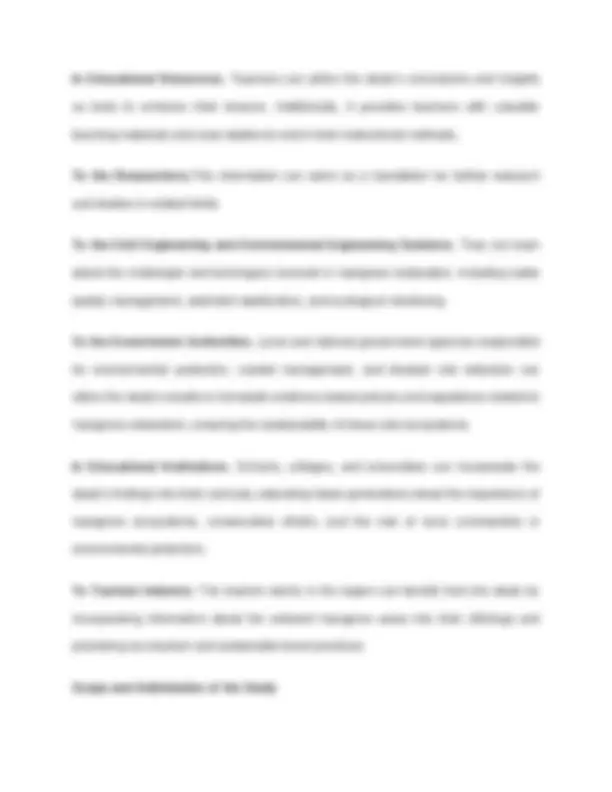




Study with the several resources on Docsity

Earn points by helping other students or get them with a premium plan


Prepare for your exams
Study with the several resources on Docsity

Earn points to download
Earn points by helping other students or get them with a premium plan
Community
Ask the community for help and clear up your study doubts
Discover the best universities in your country according to Docsity users
Free resources
Download our free guides on studying techniques, anxiety management strategies, and thesis advice from Docsity tutors
Mangroves play a crucial role in coastal ecosystems, providing numerous ecological benefits such as shoreline protection, carbon sequestration, and habitat provision for various species. In Queen Tuna Park, situated along the Lion's Beach in General Santos City, the restoration of mangrove forests has become a focal point for environmental conservation and sustainable development efforts. However, mangrove forests worldwide have been facing significant degradation due to human activities and natural disturbances. In response, restoration efforts have been initiated to regain the lost mangrove areas and restore their ecological functions. This study aims to assess the effectiveness of mangrove restoration in Queen Tuna Park, Lion's Beach, General Santos City.
Typology: Summaries
1 / 4

This page cannot be seen from the preview
Don't miss anything!



Assessing Mangrove Restoration in Queen Tuna Park, Lion's Beach, General Santos City Introduction Mangroves play a crucial role in coastal ecosystems, providing numerous ecological benefits such as shoreline protection, carbon sequestration, and habitat provision for various species. In Queen Tuna Park, situated along the Lion's Beach in General Santos City, the restoration of mangrove forests has become a focal point for environmental conservation and sustainable development efforts. However, mangrove forests worldwide have been facing significant degradation due to human activities and natural disturbances. In response, restoration efforts have been initiated to regain the lost mangrove areas and restore their ecological functions. This study aims to assess the effectiveness of mangrove restoration in Queen Tuna Park, Lion's Beach, General Santos City. Statement of the Problem The mangrove restoration project in Queen Tuna Park, Lion's Beach, General Santos City, represents a critical endeavor to conserve coastal ecosystems and enhance the quality of life for local communities. However, several key challenges and questions warrant investigation to ensure the success and sustainability of this initiative: Mangrove Ecosystem. Are the restored mangrove areas in Queen Tuna Park exhibiting signs of ecological recovery, including biodiversity restoration, water quality improvement, and sediment stabilization?
Socio-Economic Impact. What are the socio-economic implications of mangrove restoration for the local communities, such as changes in livelihoods, income generation, and community resilience to natural disasters? Community Engagement and Participation. To what extent are local communities actively involved in the restoration efforts, and what factors influence their level of engagement and commitment to long-term mangrove conservation? Environmental Threats. What are the prevailing environmental threats to the restored mangrove areas, including pollution, habitat degradation, and climate change impacts, and how can they be mitigated effectively? Sustainability and Management: How can the restoration project be managed and sustained in the face of evolving environmental and socio-economic conditions, and what policy and management recommendations can ensure its long-term success? Significance of the Study A study assessing mangrove restoration in Queen Tuna Park, Lion's Beach, and General Santos City can benefit a diverse range of stakeholders, including: To the Local Communities. The study's findings can directly impact the livelihoods and well-being of the residents living in proximity to the mangrove areas.
This study focused on Assessing Mangrove Restoration in Queen Tuna Park, Lion's Beach, General Santos City. The respondents of the study were local community member, government and non-governmental organization (NGO) representatives, local businesses and fishermen, and tourist. The study was conducted in Queen Tuna Park Lion’s Beach, General Santos City. Overview of Methodology